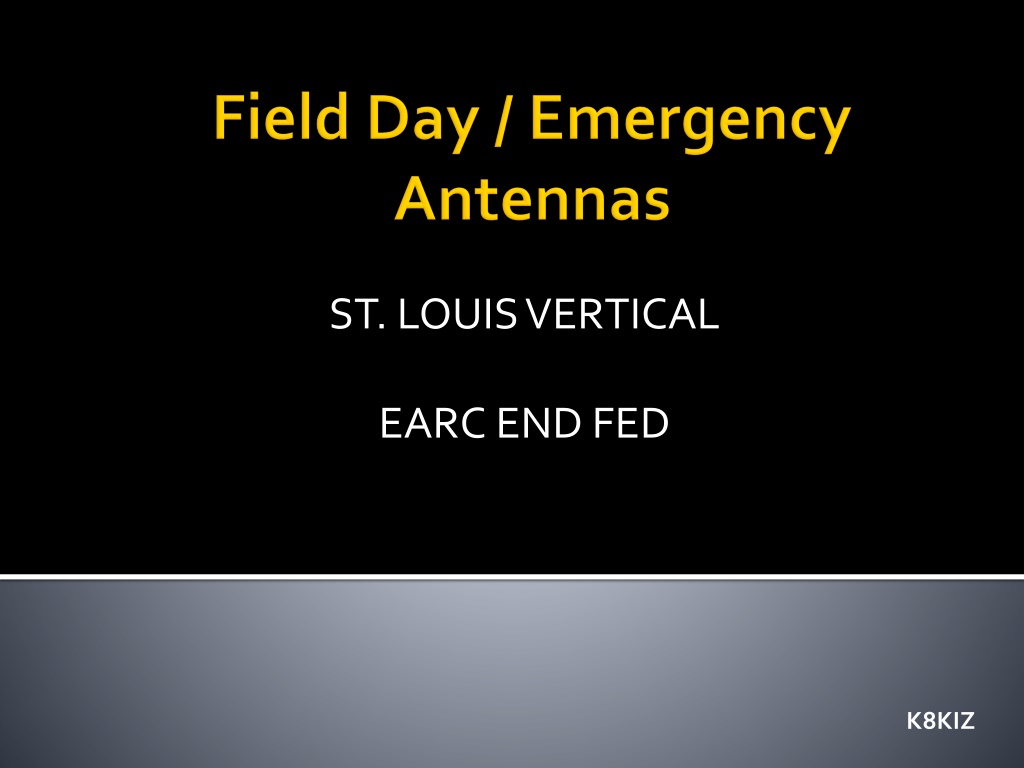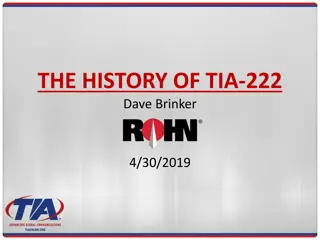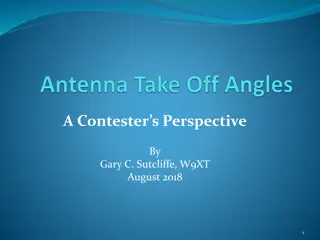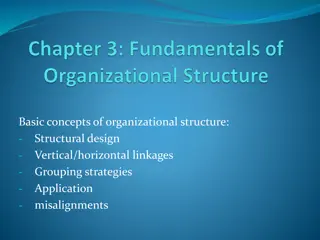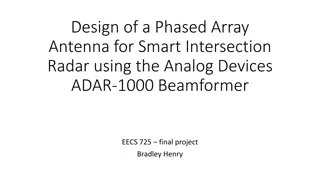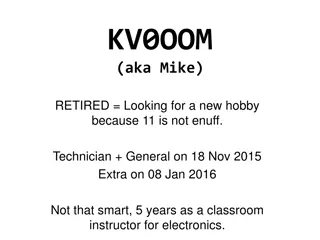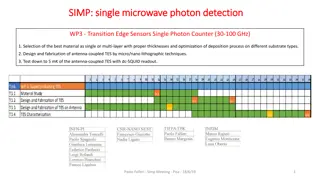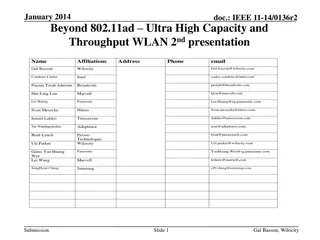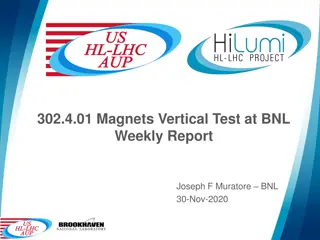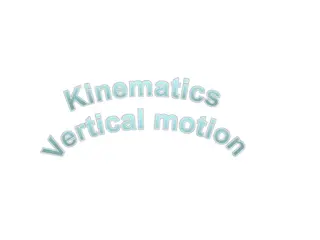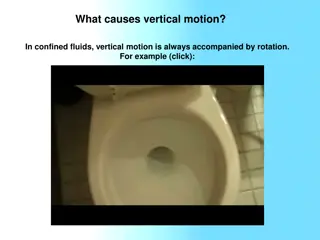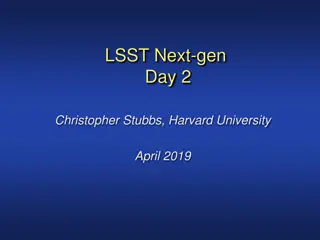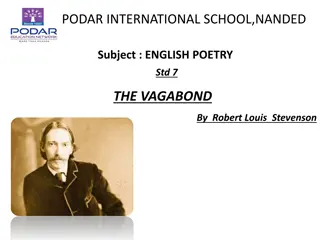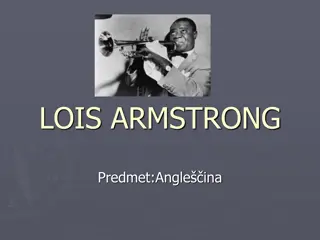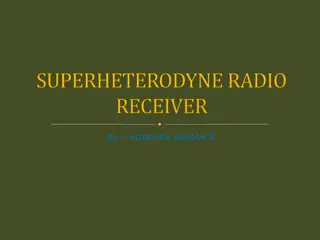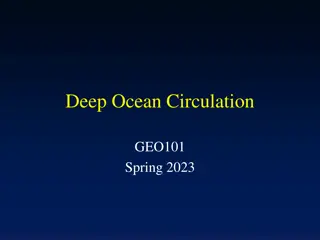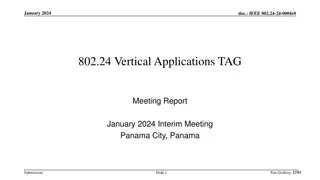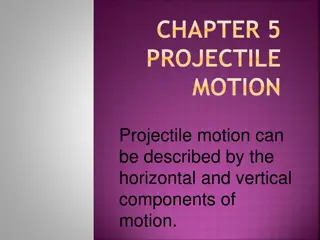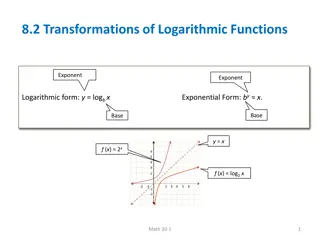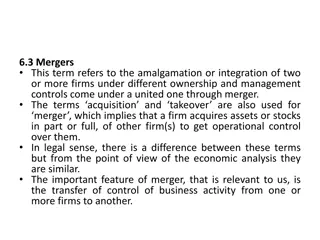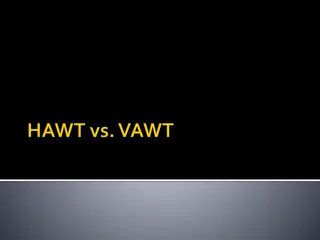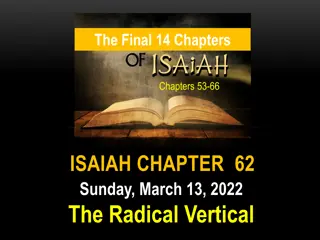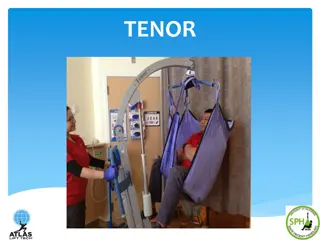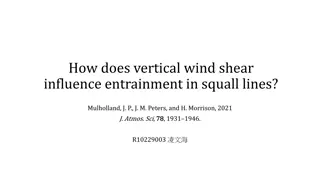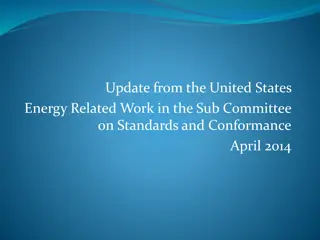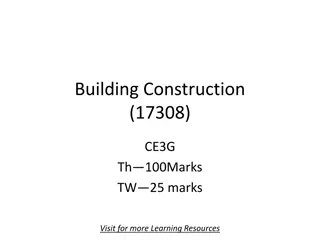Building the St. Louis Vertical Earc End-Fed Antenna - K8KIZ
The St. Louis Vertical Earc End-Fed antenna, designed by K8KIZ, has a strong reputation among ham radio enthusiasts. Originally utilizing Radio Shack twin-lead, modifications over the years have improved its design, making it easy to set up and operate. The antenna consists of a collapsible pole, PVC pipe base, custom coil, ground radials, and a tuning coil for specific bands. Detailed instructions and components are provided, making it accessible for quick installation and usage.
Download Presentation

Please find below an Image/Link to download the presentation.
The content on the website is provided AS IS for your information and personal use only. It may not be sold, licensed, or shared on other websites without obtaining consent from the author. Download presentation by click this link. If you encounter any issues during the download, it is possible that the publisher has removed the file from their server.
E N D
Presentation Transcript
ST. LOUIS VERTICAL EARC END FED K8KIZ
The St. Louis Vertical has a long and respected reputation among hams. It was originally designed to take advantage of Radio Shack 300 ohm twin-lead for home televisions. It consisted of an antenna base wrapped with twin-lead and a 14 foot length of vertical twin-lead. It also used 3 ground radials that doubled their effective length. K8KIZ
But two events modified the basic design over the years: 1) Radio Shack stopped making the cheap twin-lead (which happened to be the perfect size for the coil spacing) and, 2) Experimentation led to the design of a tuning coil that could be tapped for operation on specific bands. K8KIZ
The SLV can be set up in about 5 minutes. The main components are: 9 1) A collapsible 20 foot crappie pole. 2) A 1-1/2 diameter PVC pipe base with 12 gutter nail. 3) A PVC cap to hold the crappie pole steady. 4) A custom coil wound on 1-1/4 PVC pipe with 18 awg solid wire. 5) Three 20 speaker wire ground radials. 6) A coil tapping wire with a clip on one end. 7) A 7 foot vertical 18 awg wire for the radiator. 8) Minimum 16 coax feedline. 9) Antenna Tuner 7 6 4 3 8 2 1 5 K8KIZ
A wooden plug is used for the base with a center hole for a 12 long gutter nail. The two screws on the side of the tubing stop the plug from turning. (Take a spare nail with you to hammer into hard ground first for easier installation.) Four holes were drilled above the wooden base for #14 AWG wire in a criss-cross pattern to hold the bottom of the crappie pole. The BNC antenna connector is visible along with external taps for the ground radials and the coil tapping wire. K8KIZ
Heres a view of the base showing the coax connector and the three ground radials. The radials are lengths of 20 long 18 awg speaker wire: 1) The wire pair at one end are shorted together for a total effective length of 40 . 2) Measure out 6.5 from the other end and remove 1 of wire from just one side. (If possible do NOT remove the insulation. Slit the insulation, pull the inner wire out, and then cut each end. The wire insulation will help retain dimensional stability.) Radials now resonate at 33.5 for 40 meters. The orange wire with clip connects to the tuning coil on the pole above. K8KIZ
A view of the shorted end of one of the ground radials. K8KIZ
The coil assembly is made from 1-1/4 PVC . I cut a wide slot down the center of the coil to allow easy attachment of a tuning clip. My antenna is intended for 40m through 6m operation and has a winding length of 7 with 1/8 spacing of 18 awg solid copper wire between coil windings. The end caps were drilled out to allow the coil to slide down to the top of the 1st extension on the crappie pole. (The statue in the background is not St. Francis as many assume, but St. Marconi, the patron saint of wireless communication ) K8KIZ
Crappie poles can be annoyingly flexible at the top! One trick to keeping it vertical when attaching the radiating wire is to slide a wire connector down the top section of the mast a bit and bend over it at a right angle. Use a fishing swivel connector on the end of the radiating wire to attach it to the connector. Now the wire hangs vertically without bending the mast! K8KIZ
Time for a field test! (Note the careful placement of the table, test equipment, and chair for maximum comfort in the shade!) K8KIZ
Resonance calibration setup: MFJ -259 C Antenna Analyzer Emtech ZM-2 ATU Tuner (15 watts power or less) Notepad & Pen K8KIZ
Note 52.223 MHz with 1.7:1 SWR at 50 ohms! The ZM-2 is a remarkably fast QRP tuner to operate! First adjust to loudest band noise, and then tune with xmtr signal and tweak until LED goes out! K8KIZ
PROOF OF PERFORMANCE TAP 25 t 25t 26t 26t 26t 29t 29t 34t 30t 30t 27t 27t FREQ 7.0 7.3 10.1 14.0 14.3 21.0 21.4 24.9 28.0 29.0 50.0 52.0 SWR 1.0:1 1.2:1 1.4:1 1.3:1 1.0:1 1.0:1 1.4:1 1.2:1 2.0:1 2.7:1 2.1:1 1.7:1 ZM 4.0/9.0 40 5.8/8.9 40 5.8/1.2 30 2.8/0.0 20 4.7/1.3 7.1/9.1 15 6.9/9.8 15 8.7/7.0 12 10.5/8.1 10 10.5/8.5 10 0.2/9.3* 6 3.5/9.8* 6 BAND 20 (*ZM with 250pf switched in) K8KIZ
The secret to this remarkable antenna is its 9:1 UNUN (Unbalanced to Unbalanced) trifilar wound toroid matching transformer. It requires NO ground radials! The transformer uses a T-130-2 powdered iron toroid, and three 20 pieces of 22 AWG solid insulated copper wire of different colors. (You can buy the assembled unit from the Volunteers of the Honolulu Emergency Amateur Radio Club for under $60.) K8KIZ
The UNUN transformer and connecting parts can be assembled in a standard shallow plastic electrical box. Basically the UNUN connects to a coax connector (SO-239 or BNC) and with two additional 8-32 screw connectors for both a 30 length of antenna wire and a possible counterpoise. K8KIZ
K8KIZ The counterpoise (right connector) is typically optional The outer braid of a minimum length of 16 ft of connecting coax will provide the necessary counterpoise. (No additional counterpoise was used in our testing. )
Ideally, the 30 ft length of antenna wire should be hung as high as possible. But conditions are seldom ideal. This setup uses about 15 vertically on a crappie pole, and another 15 horizontally to a small table to keep the UNUN box off the ground. K8KIZ
A simple velcro tie keeps the antenna wire snug against the crappie pole. K8KIZ
Remember to use a minimum of 16 of coax to connect to your rig! (The outer braid is your counterpoise.) K8KIZ
The base for the St. Louis Vertical, along with the 20 crappie pole, proves useful once again! (But this time as a vertical support system only.) K8KIZ
Resonance Testing was done with a MFJ-259C antenna analyzer, and an Emtech ZM-2 ATU QRP tuner. K8KIZ
K8KIZ Collecting the Data .
PROOF OF PERFORMANCE FREQ 7.1 7.3 10.1 14.0 14.3 18.0 21.0 21.4 24.9 28.0 29.0 30.0 SWR 1.4:1 1.2:1 1.9:1 1.0:1 1.0:1 2.2:1 1.7:1 1.8:1 1.0:1 1.5:1 1.0:1 1.0:1 ZM 3.6/12.0 off 4.3/12.0 off 12/1.5 7.3/4.5 7.5/50 0.4/3.7 0.3/4.3 0.3/4.5 0.2/5.5 500 pf 0.2/6.5 250 pf 0.2/6.5 250 pf 0.2/6.5 250 pf CAP BAND 40 40 30 20 20 17 15 15 12 10 10 10 500 pf 250 pf 250 pf 250 pf 250 pf 500 pf K8KIZ
K8KIZ Listening to the band come alive using the EARC antenna!
